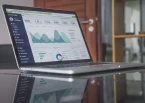The End of Growth: Facing the Climate Crisis and Building a Stronger Future

The Unsustainability of Our Current Economic System
The current economic system is based on the principle of infinite growth, where the consumption of goods and services is seen as the key to economic success. However, this system is unsustainable because it is based on the exploitation of finite resources, such as fossil fuels and minerals, and the degradation of our planet’s natural systems. As a result, we are facing multiple ecological crises, including climate change, biodiversity loss, and soil depletion.
One of the main problems with our economic system is the overconsumption of resources. We are using resources at a faster rate than they can be replenished. For example, we are extracting more oil and gas than the Earth can produce, leading to the depletion of these resources. Similarly, we are cutting down forests faster than they can grow back, which has led to deforestation and a loss of biodiversity.
Another issue with our economic system is the production of waste. We are generating more waste than our planet can handle, leading to pollution and environmental degradation. For example, plastic waste is causing harm to marine life and polluting our oceans, and electronic waste is contaminating soil and water sources.
Moreover, our current economic system is also exacerbating inequality. The benefits of economic growth are often concentrated among the wealthy, while the costs of environmental degradation are borne by the poor and marginalized communities.
To build a sustainable economic system, we need to shift from a growth-based model to one that is based on the principles of sustainability and equity. This means using resources more efficiently, reducing waste, and investing in renewable energy sources. It also means prioritizing the needs of people and the planet over profits and economic growth. By doing so, we can create a more just and sustainable world for all.
The fallacy of infinite growth: The emperor has no clothes
One of the fundamental problems with our current economic system is the idea of infinite growth. This concept assumes that economic growth can continue indefinitely, but it ignores the fact that we live on a finite planet with finite resources.
The pursuit of infinite growth has resulted in many negative consequences, including environmental degradation, social inequality, and a focus on short-term gains over long-term sustainability. The idea of infinite growth has become so ingrained in our culture that it is often seen as an unquestionable truth, but it is a fallacy that needs to be challenged.
The video script points out that the global economy is currently using resources at a rate that is 1.7 times faster than the planet’s ecosystems can regenerate them. This means that we are using up resources faster than they can be replenished, which is clearly not sustainable in the long run.
Moreover, the pursuit of infinite growth has also led to widening inequality. As wealth and resources become concentrated in the hands of a few, the rest of society is left to compete for the scraps. This has resulted in a society where the wealthiest 1% own more than half of the world’s wealth, while the bottom 50% own less than 1%.
In short, the idea of infinite growth is a fallacy that needs to be addressed if we want to create a sustainable future. We need to shift our focus from short-term profits to long-term sustainability and find ways to live within the limits of our planet’s resources.
Facing the inevitable: Why we need to prepare for the end of growth
The idea that infinite economic growth is unsustainable is a difficult pill to swallow for many people. However, the reality is that we live in a world of finite resources, and eventually we will reach the limits of what our planet can sustain. The sooner we accept this fact, the better prepared we will be to deal with the inevitable changes that will come.
One of the main challenges we face is the need to transition from a growth-based economy to one that is more focused on sustainability. This will require us to rethink our priorities and to shift away from our current model of consumerism and excess.
We will also need to invest in new technologies and find more efficient ways to use the resources we have. For example, we could shift our energy production from fossil fuels to renewable sources like wind and solar power. We could also focus on creating products that are designed to last longer and be reused or recycled, rather than being thrown away after a single use.
Preparing for the end of growth will also require us to rethink our social structures and the way we live our lives. We may need to adopt more minimalist lifestyles and focus on building stronger communities that can support each other in times of need.
In conclusion, the end of economic growth is a daunting prospect, but it is also an opportunity for us to create a more sustainable and equitable world. By accepting the reality of our finite resources and investing in the technologies and social structures that will support a more sustainable future, we can ensure that our planet is able to support future generations.
From denial to acceptance: The first step towards a sustainable future
Admitting that our current economic system is unsustainable is just the first step towards a sustainable future. However, accepting this fact is not easy because we have been conditioned to believe that economic growth is essential for progress and well-being.
To move towards sustainability, we need to start rethinking our values and priorities as a society. We need to prioritize the well-being of our planet and all living beings over economic growth. This shift in values will require us to change our behaviors, such as reducing our consumption and waste, supporting sustainable practices and technologies, and promoting equity and social justice.
There are already some positive changes happening around the world, such as the increasing adoption of renewable energy sources and the growing interest in sustainable living. However, these changes are not happening fast enough, and we need to do more to accelerate the transition towards sustainability.
Accepting the need for change can be overwhelming, but we can take small steps towards sustainability in our daily lives. We can reduce our meat consumption, recycle, use public transportation or carpool, and support sustainable businesses and practices.
Overall, the first step towards a sustainable future is to acknowledge the unsustainability of our current economic system and hug the need for change. It is only by working together and making small changes in our daily lives that we can build a more sustainable and just future for all.
The danger at our civilization’s door: Why we need to act now
The final part of the video discusses the urgent need for action in the face of the looming environmental crisis. The speaker emphasizes that we need to act quickly and decisively in order to avoid the worst possible outcomes.
One of the biggest dangers facing us is climate change, which is already causing significant damage around the world. Rising sea levels, droughts, floods, and extreme weather events are all symptoms of this crisis. But climate change is just one of the many environmental problems we face. Deforestation, overfishing, pollution, and loss of biodiversity are all taking a heavy toll on the planet.
The speaker argues that we need to take bold action to address these problems, such as investing in renewable energy, implementing sustainable farming practices, and protecting natural habitats. However, they also acknowledge that individual actions alone are not enough, and that systemic change is needed at a global level.
Ultimately, the speaker concludes that the key to a sustainable future is to shift our focus away from growth at all costs and towards a more equitable and sustainable model of development. Only by working together to tackle these problems can we hope to ensure a livable planet for future generations.
The power of fear: How it can motivate us to face the climate crisis
While fear is often viewed as a negative emotion, it can actually be a powerful motivator for action. The fear of the consequences of our actions, or inaction, in the face of the climate crisis can motivate us to take steps towards a sustainable future.
One way fear can motivate us is by highlighting the urgency of the situation. The consequences of climate change, such as extreme weather events, rising sea levels, and food and water shortages, are already being felt around the world. If we don’t act quickly, these consequences will only become more severe and widespread.
Another way fear can motivate us is by focusing on the impact our actions have on future generations. By acknowledging the potential for a bleak future for our children and grandchildren, we are more likely to take action to create a better world for them.
While fear can be a powerful motivator, it’s important to avoid becoming paralyzed by it. Instead, we should use fear to inspire action and drive us towards solutions. We need to work together, as individuals, communities, and nations, to create a sustainable future for ourselves and future generations.
The One Degree War Plan: A Solution to Eliminate Net CO2 Emissions
The One Degree War Plan is a plan that aims to eliminate net CO2 emissions by transforming the global economy in a way that creates a sustainable future. The plan was inspired by the rapid mobilization of resources during World War II and it suggests that the world should treat climate change with the same level of urgency as we treated the war.
The plan suggests several steps to reach net-zero CO2 emissions. Firstly, we need to restructure the global economy to be more sustainable. This means transitioning from a linear “take-make-waste” economy to a circular economy that eliminates waste and pollution. Secondly, we need to rapidly deploy renewable energy sources like wind, solar, and hydro power to replace fossil fuels. Thirdly, we need to phase out all fossil fuel subsidies and redirect those funds towards developing and scaling up renewable energy.
The plan also suggests that we need to invest in new technologies that can help us decarbonize sectors that are currently difficult to decarbonize, such as aviation and shipping. In addition, the plan proposes a shift towards plant-based diets and regenerative agriculture to reduce the emissions associated with livestock production.
To achieve these goals, the plan proposes that governments and businesses need to work together to create policies and regulations that support the transition to a sustainable economy. The One Degree War Plan is a call to action to eliminate net CO2 emissions and create a sustainable future for all.
Choosing life over fear: The opportunity to build a stronger and happier society
While the climate crisis may seem daunting, there is a silver lining. By facing the reality of our situation and taking action, we have the opportunity to build a stronger and happier society. Instead of living in fear of what the future may hold, we can work together to create a better world for ourselves and future generations.
One way to do this is by transitioning to a circular economy, where waste is minimized and resources are used efficiently. This approach not only helps the environment but also stimulates innovation and job growth. Furthermore, we can focus on creating more livable cities, improving public transportation, and promoting sustainable agriculture.
The key is to prioritize the well-being of people and the planet over profit. This shift in priorities will not only lead to a more sustainable future but also a more fulfilling one. As we work together towards a common goal, we can build stronger communities and foster a sense of connection and purpose.
In short, the choice is ours. We can continue to live in fear and denial or hug the opportunity to create a better world. By choosing life over fear, we can build a happier, more resilient society for all.
Conclusion
The current economic system, based on the assumption of infinite growth, is unsustainable. The planet’s resources are finite, and our consumption and production patterns are causing irreparable damage to the environment. We must acknowledge this fact and prepare for the end of growth, shifting our focus towards creating a sustainable and equitable society.
The first step towards a sustainable future is to acknowledge the reality of the climate crisis and the severity of its consequences. We must act now to lessen its effects and build a better future for ourselves and future generations. This requires collective action and a shift in societal values towards sustainability and environmental responsibility.
While fear can be a powerful motivator, it is important to approach the climate crisis with a positive and constructive attitude. We must see it as an opportunity to build a stronger, happier, and more resilient society, where people and the planet come first.
The One Degree War Plan provides a concrete solution to eliminate net CO2 emissions and limit global warming to 1 degree Celsius. By focusing on renewable energy and regenerative agriculture, we can create a sustainable and thriving economy that benefits everyone, not just a few.
The future is not predetermined, and we have the power to choose a different path. Let’s choose life over fear and work together to create a better world for ourselves and future generations. It won’t be easy, but it’s necessary, and it’s possible.















